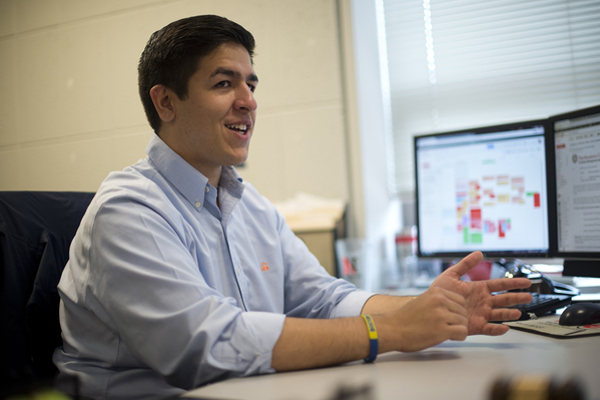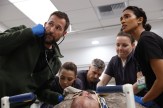3Qs: Meet IDEA’s new CEO

Nick Naraghi, DMSB’15, served as president of the Student Government Association last year. Now, the finance student in the D’Amore-McKim School of Business is leading IDEA, Northeastern University’s student-run venture accelerator.
Here, Naraghi reflects on his SGA experience and discusses his vision for IDEA and personal interest in entrepreneurship and innovation.
Can you reflect on your time as SGA president, and how that experience has prepared for this new role as CEO of IDEA?
Serving as the president of the Student Government Association was a great experience. It’s a unique role on campus. You’re working closely with university administrators, you’re managing officers within SGA, and you’re representing the entire student body.
The ability to work effectively with people is a skill that is often taken for granted. In a leadership role, you’re not just working alongside others. You must keep them motivated and excited, give them autonomy, and play to their strengths and help them build on their weaknesses. One of the most fulfilling parts of being SGA president was seeing people grow and excel in their roles. That experience has helped be become a better leader, and it’s made me more confident in myself. That’s part of the experience I’ll be bringing to IDEA.
I’m the first CEO to come from outside of the organization. That presents its own set of challenges, but it’s also an opportunity to take a fresh look at the way we do things. I’ve spent the past few months learning about all of our processes and day-to-day activities, and I’m very much looking forward to using my experience to benefit IDEA.
What’s your vision for IDEA? What are some areas you hope to evolve or improve upon?
We’re working as a team to develop our yearlong vision as well as our specific goals for the coming semester. IDEA has already developed a wide range of services, including non-equity funding, mentoring, coaching, and other resources. Overall, everything that we do this year needs to be focused on our core mission: to educate entrepreneurs and help launch successful business. One next step for the organization is the development of an internal tracking system to determine where any bottlenecks might exist and how we can improve upon connecting ventures with mentors, industry experts, and investors.
I’m also asking the team to think about where we’d like to see IDEA in five years. We’re in positions that we might only hold for a year or so, and we want to make sure we’re continuing to prepare our successors to take the organization to the next level. We’re also constantly trying to inform the Northeastern community about the resources IDEA can provide for student and alumni entrepreneurs. One of our key points is that IDEA is for everyone, not just business students; only about one-third of our ventures are from students and alumni in the D’Amore-McKim School of Business. We would love to see more ventures with students from several disciplines and majors. One way to do that is by collaborating with other organizations on campus and clearly demonstrating what IDEA can offer.
When did you first get involved in IDEA, and how long have you been interested in entrepreneurship?
IDEA was founded in 2010, the same year I arrived at Northeastern. It piqued my interest right away. I’m good friends with Chris Wolfel, who was IDEA’s CEO two years ago. Additionally, over the past year as president of SGA, I worked alongside IDEA’s previous CEO Max Kaye and attended many events involving IDEA. I originally approached IDEA about creating my own venture, and then this opportunity to become CEO presented itself.
When I was a kid, I thought I’d be an inventor one day. I was always into building things, whether it was with Legos or just hacking stuff together from around the house. I wanted to identify creative solutions to everyday problems and really impact the world by coming up with new ideas. One of reasons I came to Northeastern was its reputation for experiential learning and entrepreneurship. Now as CEO of IDEA, I have an amazing opportunity to be involved with the entrepreneurship community, help expand IDEA’s reach and our ability to help ventures from Northeastern, and learn more about myself along the way.
I’ve also been influenced by my business courses. In professor Harlan Platt’s Turnaround Management course, we looked at businesses that were in or at risk of going into bankruptcy and created strategies to restructure them. That got me thinking about entrepreneurship in a completely new way. You’re coming into the situation with an entrepreneurial mindset and thinking about how to innovate in a well-established company that’s failing. My Corporate Finance course with professor Richard Swasey also taught me the fundamentals of assessing a company’s financial records, cash flow, and other important business principles, all of which are very helpful in understanding what a startup needs to consider as they build their company.





